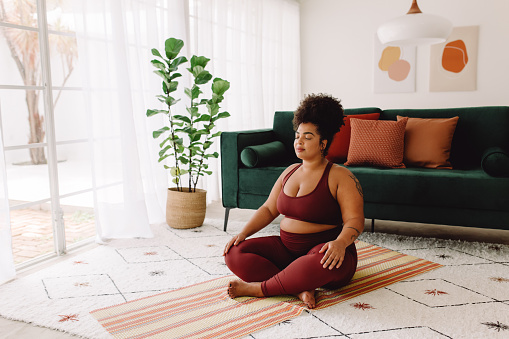Obsessive Compulsive Disorder (OCD) is something most people have heard of, but many people haven’t actually experienced it. OCD has become a catch-all term used to describe preferences and habits, regardless of whether the person actually has OCD or not. OCD is not an adjective. For example, people might say they are “OCD about cleaning” or “OCD about organizing.” This sort of narrative, the casual dismissiveness of the real struggle, can be stigmatizing and cause those with OCD to feel misunderstood and alone. This is the last thing anyone needs and can make coping with a diagnosed mental illness even more difficult than it can all on its own. You see, living with OCD without the right treatment becomes very debilitating. You struggle with intrusive thoughts that are ego-dystonic, where the thoughts and compulsions experienced or expressed are not consistent with your self-perception and worldview. These pervasive thoughts contradict your actual wants, needs, and goals.
OCD has an impact on almost all areas of your life. It can show up at work and in your personal life. It can be there first thing in the morning and be the last thing you think about at night.
It will show up when you are eating, walking, showering, or even having sex. It is not a conscious choice you make but more of an intrusion. There are no limits to where and how OCD may show up. This can make even the simplest plans or what looks like the most relaxing days feel stressful and overwhelming. So how do you take care of yourself in the midst of this battle?
3 Self-Care Tips for Managing OCD
1) Practice self-compassion:
Before you do anything else, you must establish a foundation filled with compassion and understanding. Living with OCD is hard enough; your inner judgment and shame can make it even harder. Self-compassion is the best practice against the inner critic who might be speaking to you and the shame and embarrassment you may be experiencing.
Self-compassion does not mean that your intrusive thoughts are valid. Self-compassion does not mean that you don’t get to challenge your OCD and engage in response prevention. It does not mean that you are going to let your compulsions call the shots in your day-to-day life. These are some of the misunderstandings around the purpose of self-compassion.
Self-compassion is the inner voice that is understanding, empathetic, and kind. It does not shame you for the bizarre and unwanted thoughts you have. It does not tell you that you are wrong or that your thoughts are right. It meets you and supports you where you are.

To determine how best to have self-compassion, you need to find the framework that is best for you. You might have a tried-and-true tactic that you refer to or a variety of tricks that work best together. A great way of showing yourself compassion is to imagine you are speaking not to yourself but to a loved one. This tactic is by no means meant to reinforce the idea that you aren’t deserving of the same love you give to others. You are not saying, “I could never speak to myself with this kindness, so I’ll imagine I’m talking to someone else.” What you are doing is stepping outside of your self-image and the pressure you put on yourself to see the issue from another point of view. You may find that you are harder on yourself than you are on other people; this exercise helps you to come up with what to tell yourself. When you have thought of how you might respond to a friend with similar complaints, you may want to write it down and read it to yourself aloud. You might want to make a voice recording and listen to it. Maybe you want to come up with some affirmations you can say while looking in the mirror.
How does self-compassion look to you?
Does it go hand in hand with self-care?
Are you able to show yourself compassion if you aren’t showing yourself care?
Can you believe that you deserve compassion if you aren’t taking steps to show yourself that you deserve care?
It’s one thing to say, “It was a hard day today,” while continuing to work. It’s another to say, “It was a hard day today, and I deserve to take a break and rest,” while listening to a podcast you like, reading a good book, doing some yoga or meditation, or going for a walk around the block. What small actions can you take throughout the day to support yourself that show compassion? Can you think of at least one for every activity or commitment you partake in? How does this self-compassion show up at work, at home, while doing errands, in your relationships, and so on?
2) Practice Mindfulness:
One of the key features of self-compassion and the overall management of OCD is a mindfulness practice. This is important because when you have OCD (and before

you seek Exposure and Response Prevention therapy), you attach meanings to your thoughts. You falsely believe that your intrusive thoughts must mean something; otherwise, why would you have them? WRONG! You are not your thoughts, and you don’t have to believe every thought you have. Research on brain imaging has proven that the brain with OCD is hyperactive and “chatty.” This means that you are being bombarded with thoughts and compulsions, even when you are seemingly still and silent.
So how does mindfulness help? Mindfulness will guide you to watch your thoughts. It is the practice of stepping away from our thoughts and self-distance where we can be an observer. And what this means is that when you step away and watch the thoughts that come and go, you get to decide how you want to respond. Remember, you are not responsible for the thoughts you have, but you are responsible for how you respond to them. And here, the key thing to remember is your values because you want your values to dictate your behaviors and actions, not your OCD and fears. So when you step away and notice a thought non-judgmentally, you can then decide, “How can I act in a way that aligns with my values and not with OCD?”
Because of the obsessive nature of OCD, your thoughts can quickly spiral if you are not being mindful. For example, you might think of something that begins to nag at you and then do a deep dive into all the past examples of this issue. Or you might begin to project the potential future outcomes of what you are thinking about. Mindfulness grounds us in the present moment. It tells us to let go of the past and future and the heaviness of carrying our thoughts about them. It allows us to seek what we need to solve the issue of the present moment. There is no way to go back and change the past, and there is no way to know the future. Now, where we are, is all we can control. That is not to say that you can just easily decide to control it. But an awareness that there is work to be done is the first step.
Using your senses to remain rooted in your current experience can be beneficial. What can you see? Perhaps you will make a point of finding all the purple in one area or studying something within arm’s reach carefully. What can you feel? Can you move your toes in your shoes to feel connected to the earth? Is there something you can touch or hold onto, like a piece of fabric or a steering wheel? What do you hear? At first, you may only hear your thoughts and your heartbeat. Can you find a way to listen beyond your own body, to birds, to traffic, to a muffled conversation in the next room? Do you taste anything; can you eat or drink something in order to bring your awareness to that sense? Maybe it’s food; maybe it’s a stick of gum or a mint. What do you smell? Fresh cut grass? Your favorite essential oil? Cleaning solution? Something baking? Freshly roasted coffee?
Sometimes, it is enough to use our senses to ground ourselves and find a sense of calm. From there, we may approach solving a problem or ignoring a compulsion, or unpacking an intrusive thought. Other times, the issue at hand is what is right in front of us. This means that grounding ourselves in our environment doesn’t distract us from or eliminate the problem. It does, however, remind us to stay focused and seek solutions rather than getting carried away with other factors outside our reach.
3) Build your support system:

While it is true that none of us go through any of our life struggles alone, I can promise you this can’t be any truer than when it comes to OCD. When you are experiencing OCD, your mind feels like your worst enemy. You may feel that you have no one who can be there for you or that you are a burden on those who you care about. Even worse, you may feel like you are the only one having these thoughts, whether it is about dogs, kids, or your loved ones. You may feel misunderstood, isolated, and lonely. As with all things in life, a support system is what helps to get you through. Building and maintaining the system is important to work.
A support system is made up of a variety of people. Of course, there are your loved ones. These are the people who you know and trust and who know and trust you. These people may or may not understand all the ins and outs of OCD but may have witnessed your struggles with it and have experienced and seen the way it impacts your life. Your loved ones can be a vital piece of the picture of who you are and where your values lie. They may remind you of why you continue to work toward managing your OCD, as you have goals, plans, and dreams that you want to share with them. These people in your support network don’t have to have their personal experience with OCD to benefit you. What you get from them is love, a listening ear, a distraction, and so on.
To connect with people who have OCD and therefore feel more understood, you might want to join online or in-person groups where you can meet and interact with people who have the same experiences you do. A great thing about technology is how it enables us to connect with people we might otherwise never come in contact with. These groups can be a great way to feel seen, to feel that your experience isn’t all in your head. They offer a place to go where you can let go of trying to explain how it feels when a compulsion becomes intrusive and skip right to the connection and empathy that you might be lacking elsewhere in your life.
We recommend having a therapist among the people in your support network. A therapist is a supporter who is neutral to your past experiences with OCD and whose sole purpose is to guide you toward living a more manageable life. Exposure and Response Prevention (ERP) therapy is a type of Cognitive Behavioral Therapy (CBT) that a therapist can use to help you manage your OCD. ERP is a process of gradually exposing you to triggers that you would typically handle through your rituals. These exposures occur while you are in a safe environment. We offer ERP at our therapy practice in Woodland Hills through in-person or online outpatient services.
It can be our greatest challenge as human beings to take care of ourselves, with or without OCD in the picture. We tend to put ourselves last for a multitude of reasons – we feel that we

“should” be able to go it alone or that others need more support than we do. We may not have had self-care modeled for us or been raised to know that we were deserving of it. When you add OCD to the mix, it can be really difficult to set aside time to look after yourself. Maybe you feel like you already require “too much care” because of the struggles you experience when your compulsions take over. Perhaps you don’t feel like you deserve care if you can’t follow through with actions that match your values. I promise you that that isn’t true. Finding your path to self-care might look a little different than someone else’s path, but that is true of everyone! We are all unique and have different needs, schedules, goals, skills, and so on. Your best self-care tool is to unashamedly accept that you are deserving of self-care, as worthy as anyone could be.
Other Services at Embracing You Therapy
Here at Embracing You Therapy, we invite you to explore with us how life would be different if you had more control over your thoughts and emotions. We invite you to consider that it is possible to accept things just as they are, embracing imperfections to create a gentler place for calm in your life.
Let’s learn what drives your OCD and find the tools that help you respond to life in a healthy, calm way. Contact us today for your complimentary 20-minute phone consultation with our Client Care Coordinators.




